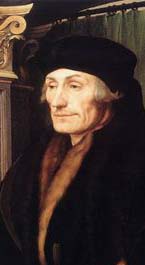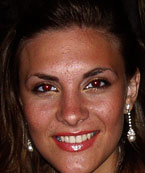
Great experience, life-long lasting memories, good fun. An Erasmus student's daily life is adventurous and full of challanges. Foreign language, foreign people; being far from home. But it will be your best period in your life!!!
History
The legal predecessor of our University was the
Reformed Theological Academy of Budapest, founded in 1855. The Hungarian Parliament granted its University status in 1900. In 1993 the General Assembly of the Hungarian Reformed Church decided to establish a university spanning a wide range of faculties, and this decision was approved later in the year on 21st September by the Parliament.
Through the creation of Károli Gáspár University, the Hungarian Reformed Church has fulfilled the aims of its forefathers. Our University, in the spirit of the “universitas scientiarium”, wants to raise the status of not solely the Church, but also the nation, through its educational, teaching and academic work. The spirit of Hungarian Protestantism was presented in such individuals as Gáspár Károli, Gáspár Heltai, Albert Szenczi Molnar, Bálint Kocsi Csergő, János Apáczai Csere, Sándor Kőrösi Csoma, the Bolyais, and more recently, László Ravasz, István Bibó, Sándor Joo, and Endre Gyökössy, amongst others. Protestant schools and universities have, through the ages, paved the way for Reformed and Hungarian culture. They will continue to do so in the future. The commitment of the Károli Gáspár University is to carry on the distinguished traditions of the Reformed Colleges of Sárospatak, Pápa, Debrecen, Kolozsvár and Nagyenyed.
In addition to the education of ministers of religion, for the purposes of academic research, training for the position of lecturer and for the degree of Doctor of Philosophy, and the awarding of degrees, its aims and objectives are to provide university - and college - level basic education in several fields and branches of scholarship, and to be capable of carrying out academic research, in accordance with the aforementioned traditions and in the spirit of the Reformation.
Theology
The first important faculty of our university was the Faculty of Theology. It offers two five-and six year, tertiary-level degree courses: Theologian / Minister of Religion, and Teacher of Religious Education. In the Faculty, a degree in Teacher of Religious Education can also be acquired by means of a two-year supplementary programme building on the basis of the ministerial training.
Education in theology is an integral part of our University’s educational system, and thus the possibility is also open to students to take other degree courses.
Humanities
The Faculty of Humanities offers wide range of study programmes such as Dutch, English, German, Japanese languages; studies on History, Psychology and Communication Sciences. The Communication Science programme gained its final accreditation in June 2000, and endeavours to provide an education of higher ethical and moral level which is concerned with positive human values. The academic discipline of Dutch Studies covers the history of the German lowlands and its former colonies, and the past and present of its material and intellectual culture.
Source: www.kre.hu
Name: Gaàl Gabriella
Nationality: Hungarian
Age: 21
Status: erasmus student
aug-dec. 2007
Guest expert: Zornitsa Stoilova -->
from Bulgaria
Where and what do you study at home?
Back home in Bulgaria I'm studying Public Relations in Sofia university, the biggest and the oldest one in my country. I am in my third year now and I have one more to finish a bachelor degree. But as a matter of fact, I'm more interested in working as a journalist later on than as a PR.
How did you end up in Belgium?
Well, to be honest, I didn't choose Belgium for my Erasmus at the first time. i wanted to go to Portugal and I was really passionate about the idea of going there. But i didn't know Portuguese and this turned out to be a problem. I was proposed to go to Belgium instead and I just said: OK! But now I'm really glad of my choice because i enjoy Belgium a lot!
Where have you been in Belgium? How do you like those places? Which was your favourite?
Except Antwerp, I have been to Brussels and Bruges. Bruges is my favourite one of the three. Maybe because I spent really great time there with my friends. We stayed over the place of one Belgium friend, went to the Christmas market. And I did Ice Skating for the first time in my life. I just loved it, it's a great old town and it's so typically Belgium. But i have to say that I like Antwerp too, it's so quiet and romantic sometimes in comparison with Sofia. Whereas, Brussels did not fascinate me that much, but I think it's because it was raining when i visited it and that just ruined my day there.
What habits do you find weird in Belgium?
Well, I cannot say weird but I really can not understand why everything must be closed in Sunday! What do the Belgium people do in Sunday? And then it is said that southern people are lazy and do not want to work. This could not happen in Bulgaria. You can find shops and supermarkets working all the time.
What was your best experience, do you have any bad ones?
Bad ones? No, I really enjoy my Erasmus here. I just had a small burden with the money at the beginning, because Belgium is quite expensive in comparison with my own country. Our university back home didn't give us our scholarship on time and that caused one boring autumn vacation in front of the TV.
I cannot say which was my best experience, but for sure I enjoy a lot everytime we gather together with the other people from the class. We have had great parties together and i will really miss that when I go back home!
If you tell that you are from Bulgaria, do the others know anything about your country?
That's interesting question! Well, when I say that I come form Bulgaria, people always say: "Oh!" with a smiley, blank face expression, that actually says "Oh, my God! I don't know what to say!". But probably it is normal not to know that much about my country. I not feel pleased about that, but at least i have the opportunity to create a good impression for Bulgaria. It depends on me what would people think for Bulgaria afterwards.

Naturally the foremost faculty in my point of view is the Law Faculty. The process of accreditation for our Faculty of Law and State Science was completed in July 1999, with Budapest registered as the official seat of the Faculty. In our legal courses attention is paid to training which provides an up-to-date knowledge in respect of the legal institutions and administration of the public and private sectors. From the academic year 1989/99, Károli Gáspár University has, in addition to the faculties already operational in Budapest, launched a full-time programme in legal education.


